
Our own Nadja Deininger was interviewed recently on The Green Room. A weekly Saturday radio show on Dublin City FM. Nadja spoke about our work with Repair Cafe and the circular economy.
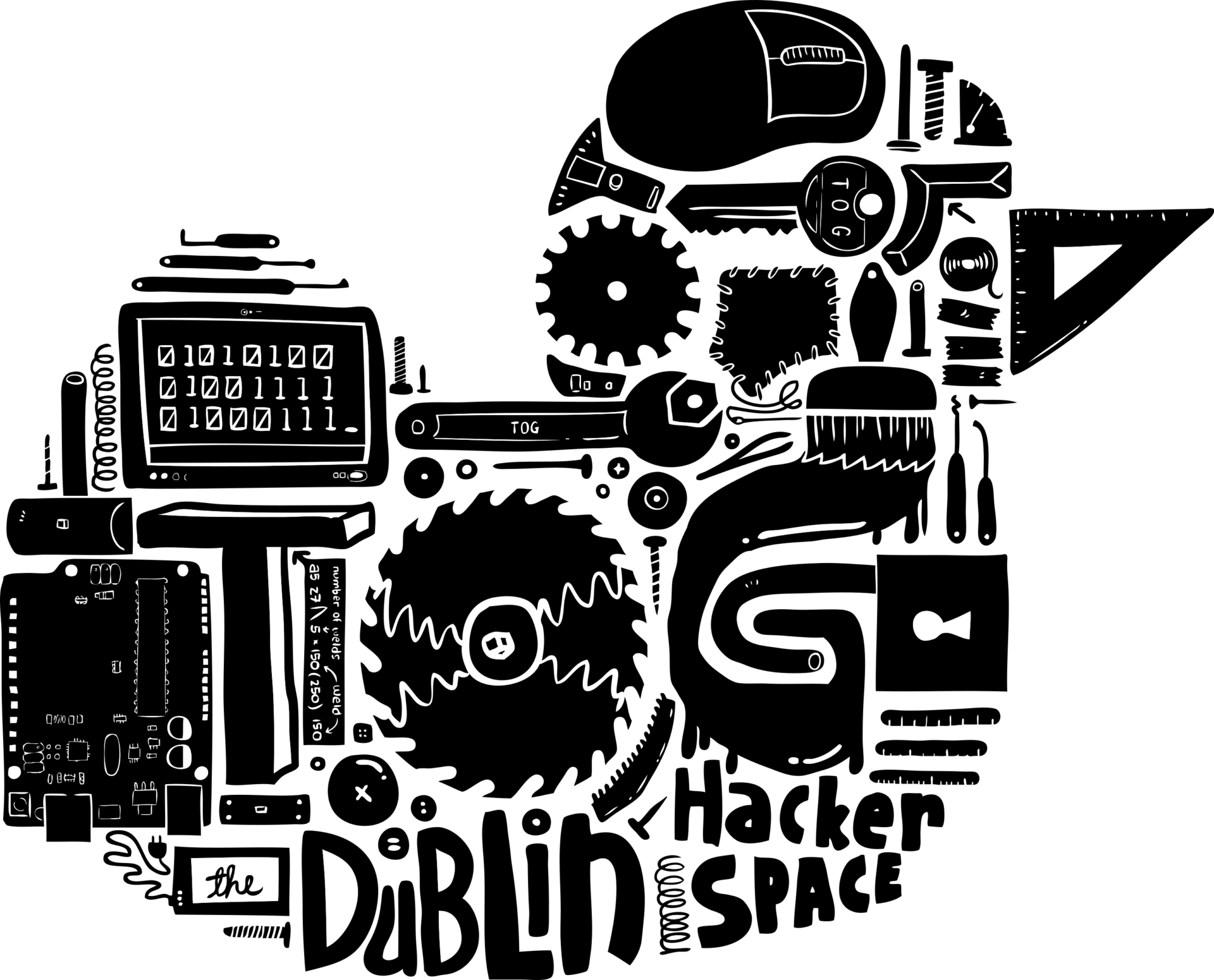
The Dublin Hackerspace

Our own Nadja Deininger was interviewed recently on The Green Room. A weekly Saturday radio show on Dublin City FM. Nadja spoke about our work with Repair Cafe and the circular economy.
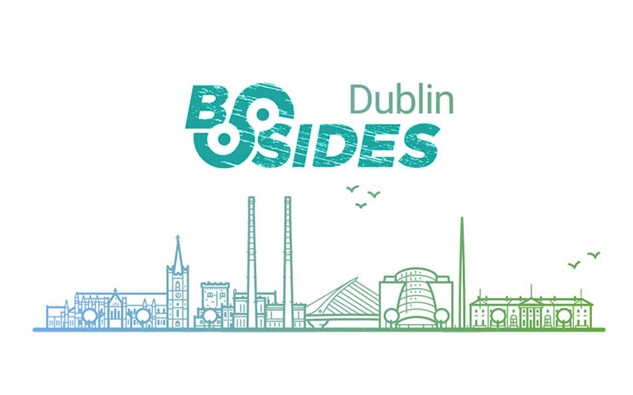
BSides Dublin is an annual information security conference organized by a community of volunteers in Dublin, Ireland. The conference provides a platform for information security professionals to share their knowledge and experiences in a collaborative and informal setting. Attendees can expect to hear from experts in the field, participate in hands-on workshops, and network with like-minded individuals. The conference covers a wide range of topics such as cryptography, network security, and ethical hacking.
Security BSides Dublin 2023 at The Convention Centre Dublin, (Date: 27 May 2023)
Tog is delighted to return as a community sponsor this year. We will be showcasing lockpicking to all visitors and what the space has to offer. To find out more about the visit

Thank you all for attending our Repair Cafe event! It was heartening to see people from all walks of life coming together to learn new skills, make new friends, and reduce waste by repairing items. We received overwhelmingly positive feedback and are already planning our next event. Thank you for being part of a community that cares about sustainability and the environment.
Check out some photos from the day. https://www.tog.ie/gallery/nggallery/all/repair-cafe-april-23

We welcomed members of the raSTEM project from Croatia. They are on a fact-finding trip to Dublin visiting STEM formal educators and non-formal.
Our own Jeffrey Roe gave them a tour and talk about what we do in Tog.
“raSTEM – Development of STEM in Vukovar”, which is supported by the European Union (European Social Fund/ Office for Associations of the Government of the Republic of Croatia).
The goal of the raSTEM project is to strengthen the capacity of civil society organizations to popularize STEM through the development of new and innovative STEM content for end users – children, youth and the population in general.
The study visit is to find examples of good practice. The group consists of 20 participants (representatives of project partners: professors, gymnasiums and technical schools from Vukovar, representatives of the University of Osijek, Faculty of Electrical Engineering, Computing and Information Technologies, City of Vukovar, Vukovar Development Agency And representatives of local CSOs).

Lead partner is of the project is, YPGD MGMD Youth Peace Group Danube, Vukovar (Croatia).
The project is implemented by the partner organizations and institutions:
1. Vura d.o.o. – Development Agency, Vukovar
2. European House, Vukovar
3. Gymnasium, Vukovar
4. Nikola Tesla Technical Secondary School, Vukovar
5. University of Osijek, Faculty of Electrical Engineering, Computing and Information Technologies
6. City of Vukovar


Join us at Tog to learn about microcontroller design and implementation using the Raspberry Pi Pico from Cornell University by following their Digital Systems Design Using Microcontrollers. The course is perfect for intermediate coders who want to take their skills to the next level.
During this course, we’ll be watching lecture videos together and discussing the content in person. We’ll be scheduling one lecture every two weeks on Monday evenings, starting with the first four lectures. After that, we’ll discuss as a group if we’re ready to proceed with the next four lectures. With 28 lectures in total, there’s plenty of material to explore and learn from.
At Tog, we provide a welcoming environment for learning and collaborating. Our fully equipped electronics lab has lots of components and test gear, and we’ll have tea, coffee, and snacks available to keep you energized throughout the course.
Please note that this is a 3rd level university course, so it may not be suitable for absolute beginners. However, if you’re interested in learning and willing to put in the effort, this course could be a great opportunity for you to develop your skills.
To participate in the course, you’ll need to bring your own laptop and Raspberry Pi Pico. Donations to Tog are welcome but not required.
If you have any questions, please don’t hesitate to reach out to us via email or visit our website for more information. We look forward to seeing you at Tog!
Timetable
Monday 24/04/23 7 pm – Lecture 1: Course Introduction
Monday 08/05/23 7:15 pm – Lecture 2: Hardware/software overview
Monday 22/05/23 7:15 pm – Lecture 3: Timers, timer interrupts, SPI
Monday 19/06/23 7:15 pm – Lecture 4: Direct Digital Synthesis
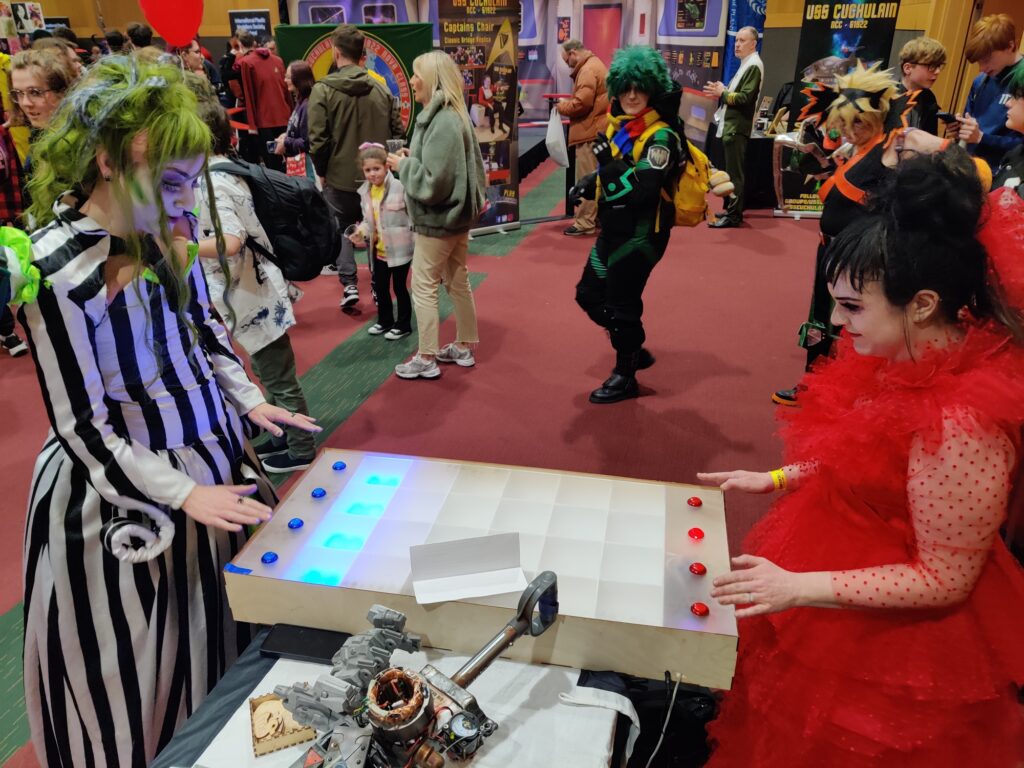
Each year the Dublin Maker festival comes around and our members Jeffrey Roe and Christian Kortenhorst want to take part. They have been to many maker festivals and collaborated over the years.
Christian likes to make big things with tools and Jeffrey likes to make things with technology and electronics. They tend to come together on their love of interactive games. While wandering around EMF camp last year they came across the work of We Throw Switches and their flux game
The goals of the project:
Eary on, it came clear we would be using arcade style buttons, and addressable LEDs to meet the project deadline of only a few weeks.
Christian got started working on the box. He create an LED display that was 4 by 6 “pixels”. Each pixel would be made up of 4 addressable LEDs. Two stripes of 50 LEDs would be used and due to the wiring layout, some would be hiddle and just covered in tape.
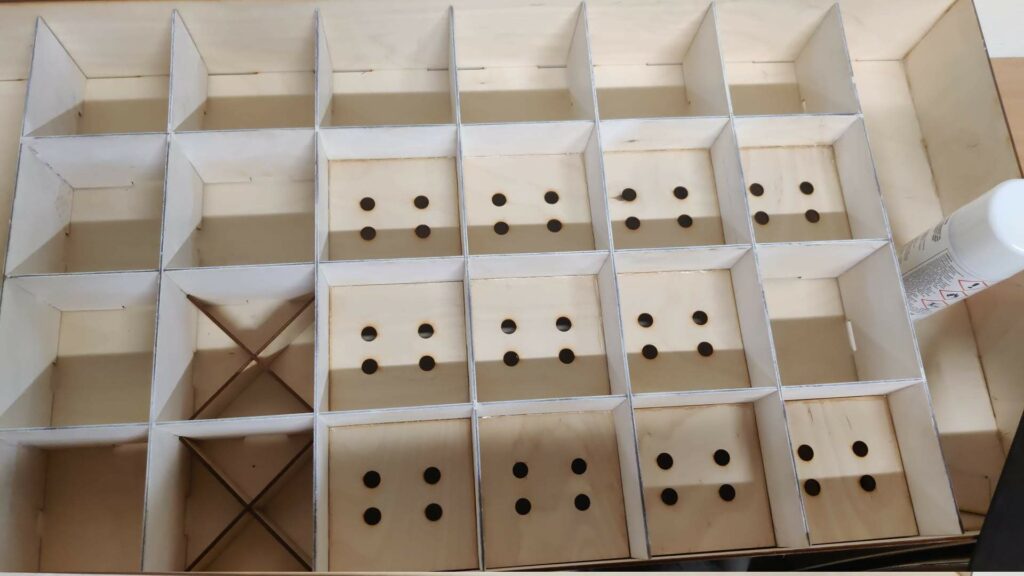
Doubts started to come to the project team. Would these LEDs work in direct sunlight? Remember the goal is to use the game in an outdoor daytime festival. Christian came up with the idea to paint everything white and Jeffrey said let’s bump up the current to make the LEDs brighter.
Now for the brain of the game. Jeffrey started out with the idea of using the USB controller that comes with buttons. How hard could it be to use a Raspberry Pi Pico and a USB host library?
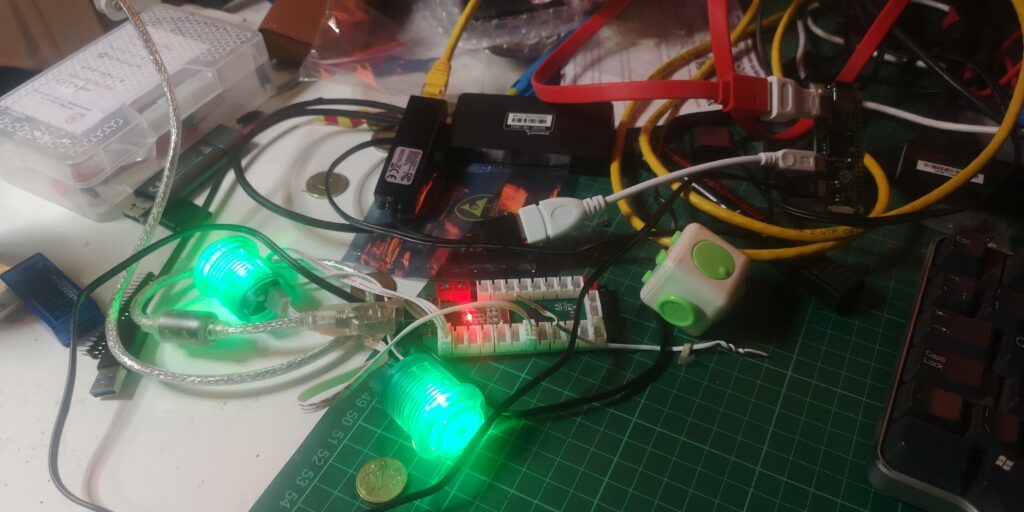
It turns out that with Jeffrey on the team running Dublin Maker there is not enough time to learn new things for projects. We quickly switched back to using the reliable and known Arduino. In order to make the game responsive all eight buttons would be required to have their own hardware interrupt.
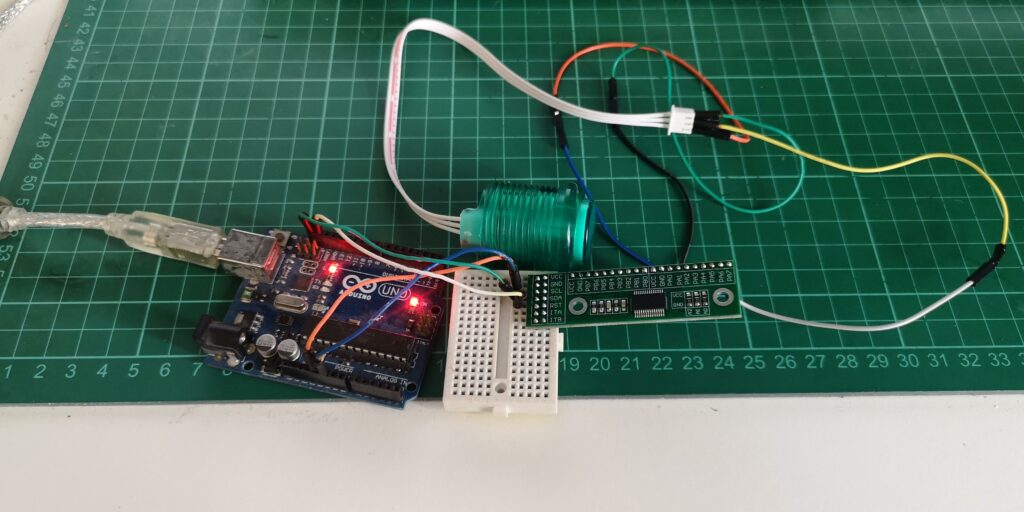
He started to use an GPIO expainder over I2C. This device allows for lots of interrupts. We started to build out a little board that would take the connector from the buttons and power the LEDs strips. The video below shows testing an interrupt to turn on the LED in the button when the button is pressed.
The code started to come together with a few late-night sessions but the interrupts didn’t seem to work as expected. Due to the way, the buttons are wired, the LED and the button share a pin and it’s only controlled by three pins. This causes the interrupts not to trigger when the LED is turned on.
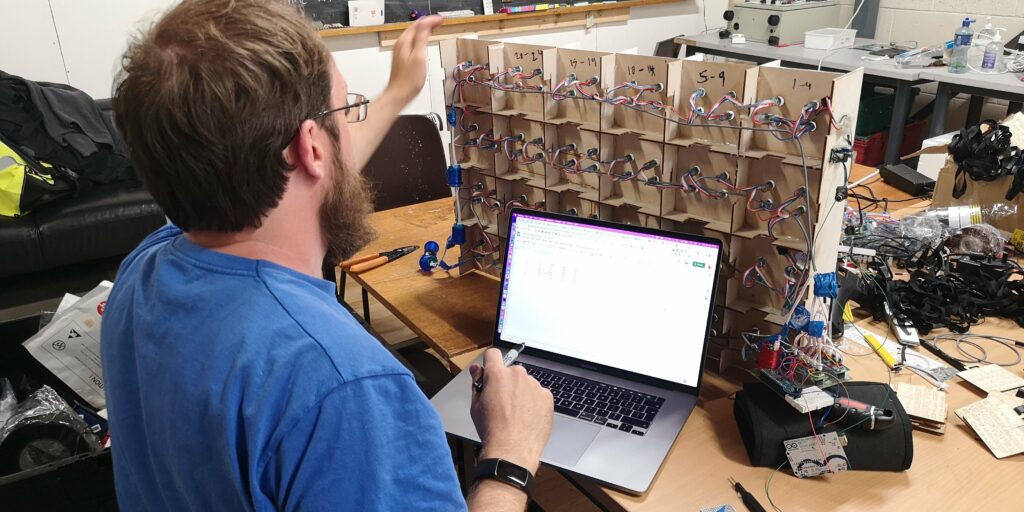
Unfortunately, we did not meet the deadline of the event and never fixed the problem before the Dublin Maker event. We coded up a bit of a demo on the LED display but was not interactive.
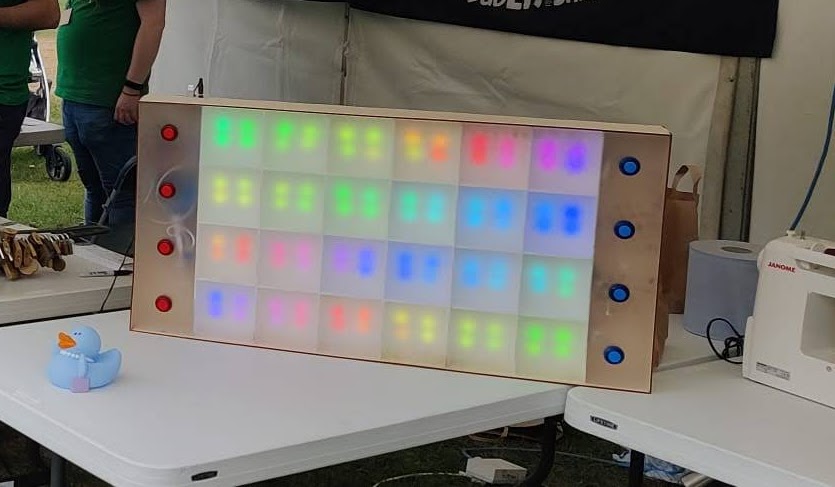
The project did not end there. Another big public event was only a few weeks with Dublin Comic Con Summer edition. During a few late-night coding sessions, Jeffrey came up with a new way to check the inputs of the buttons without using hardware interrupts but still be reactive. The code just checks the status of the expected two buttons to be pressed over and over so there is little delay.
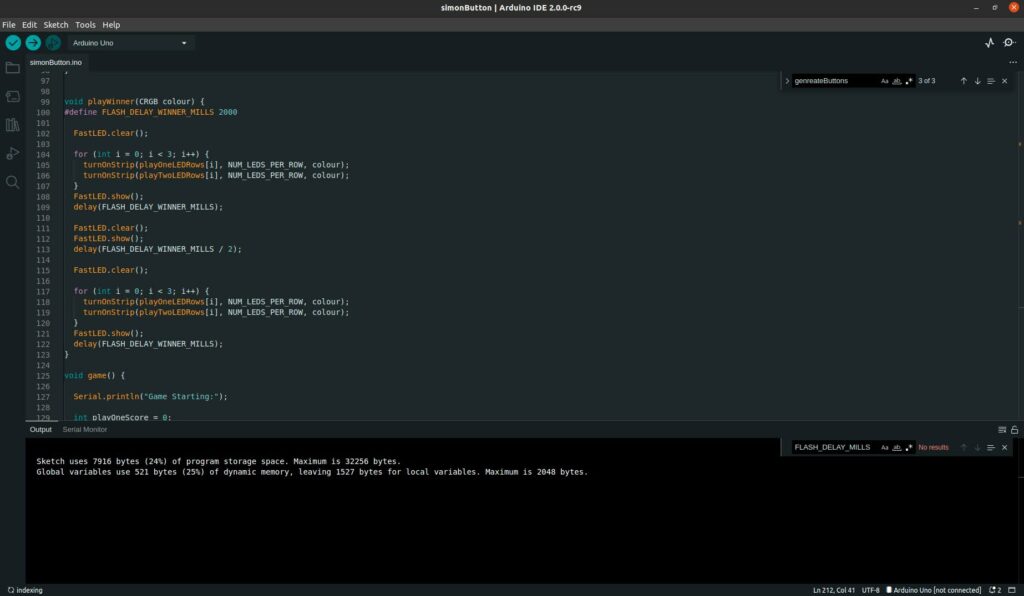
The game was unleashed to the visitors of comic con, it was a hit. People loved playing it once they got going. We did kind of miss the other goal of making the game portable as it ended up a little big.
You can check out more f the photos from the build in our gallery.